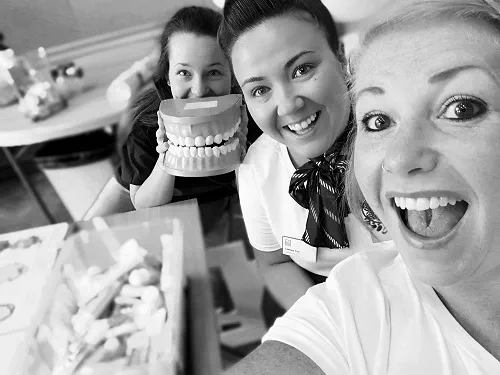
How to keep smiling during challenging times and why it’s good for you
Smiling can benefit you in many ways. Sharing a smile not only improves your mood, and the mindset of others around you, it can also improve other aspects of your life… So, the question is, how can we continue smiling in more challenging or stressful times?
Smiling is good for you
Many studies have shown smiling releases naturally occurring chemicals in the form of endorphins, dopamine and serotonin, which can trigger a positive feeling, elevating your mood, and relaxing your body1. Sharing a smile also lifts the moods of others around you, and shared laughter can build and cement relationships.
Smiling can positively impact many aspects of your day-to-day life. It can boost creativity, studies show that when you’re happier, your problem-solving ability and productivity increase2. Researchers have also found smiling can make you more successful at work3, a happy face is considered a sign of confidence, capability, being in control, and being more approachable. Having a smile can also help others trust you, with studies showing you are much more likely to trust those who smile.45

This image was produced before the COVID-19 outbreak. Therefore, current social distancing rules are not being applied.
How can you keep smiling in tough times?
While smiling has plenty of benefits, it can be difficult to share a smile on more challenging days, or in harder periods of life. Here’s some advice on ways to feel positive, even when negativity starts to creep in.

Find time to truly relax
If you're feeling stressed or upset, taking time out to relax can do wonders for your mental wellbeing, productivity and overall mood. Although what makes us feel at ease is different for everybody. Some gentle activities with relaxation and stress-relief benefits, include reading, listening to music, having a warm bath, yoga, breathing exercises and meditation. The last three are closely related to mindfulness, which is the ability to be free from distractions, and aware of what’s happening in the present moment.
Mindfulness can help you release anxiety and tension, improve your mood, and clear your head. If you’re interested in mindfulness, the Headspace website or app has helpful information and resources, and if you’re tempted by meditation, the Calm app offers guided meditation suitable for both beginners, and those with more experience.
Further tips to help you unwind, and lead a calmer, happier life, can be found on the Action for Happiness website or app.
Do what you love
Get to know yourself. Spending time on hobbies and other activities you love, whether it’s painting, playing games, listening to music, sewing, watching TV or writing, is a great way to positively boost your mood. Performing hobbies allows your brain to be focussed on the activity you love to do, taking your mind away from stressful or negative thoughts. More creative hobbies also help you express how you’re feeling, which can be helpful in relieving tension.
Learning a new skill or hobby, such as knitting, gardening, languages, software, playing an instrument, can also increase positivity; it helps you feel a sense of achievement and improves your self-confidence. If you’d like to learn a skill or hobby from home, there’s a wide variety of online services available to do this, such as Skillshare, Udemy, and Master Class, with hundreds of lessons and practical projects. There are plenty of opportunities to be productive and to give yourself a new set of skills to truly smile about.

Keep connected
Getting in touch with friends and family is a great way to feel instantly happier. Speaking to friends, family, and colleagues can calm your mood, increase your positivity, and have lasting positive effects. If you’re not with your family and friends; phoning or video calling, or even simply messaging them can all have the same positive impacts.
Reaching out to others about how you’re feeling can also be helpful. Talking things through with a friend, family member or professional, can relieve tension, and help you feel supported. You might prefer to speak to somebody you know, or alternatively you could feel more comfortable opening up to a counsellor or health professional. There are various organisations that support people suffering with mental health issues or anxiety, including Mind, Rethink and Samaritans.

Maintain a healthy lifestyle
Your diet, exercise and sleep can all have a big impact on your mood. If you’re feeling low, taking some time to exercise can boost your energy and happiness. Exercise releases the naturally occurring chemicals we mentioned earlier, which can trigger a positive feeling. Ensuring you get enough sleep is important for your wellbeing, with seven to eight hours being the average amount your mind and body need to reset.6 What you eat can also directly affect your mood and brain functionality, so ensuring you maintain a well-balanced diet, with vitamins and minerals, is important.7
Positivity, and smiling can have a huge impact, both on ourselves, and our community, especially during tough times. If you need further help or support surrounding the mental health of yourself, or a loved one, please visit the NHS or Bupa websites.
During the coronavirus pandemic, as well as sharing self-help guides and tips, we’re also sharing feel-good stories, images and videos to help raise a smile at this unusual time. If you have some suitable content, please get in touch with us on Facebook or Twitter.
References
1 Psychologytoday.com: https://www.psychologytoday.com/gb/blog/cutting-edge-leadership/201206/there-s-magic-in-your-smile
2 Everydaypower.com: https://everydaypower.com/reasons-to-smile/
3 Telegraph.com: https://www.telegraph.co.uk/women/womens-business/11384275/Want-a-promotion-Try-smiling-at-your-boss-or-just-play-Tetris.html
4 Eva Krumhuber, Antony S. R. Manstead, Darren Cosker, Dave Marshall, and Paul L. Rosin. (2007) Facial Dynamics as Indicators of Trustworthiness and Cooperative Behaviour, the American Psychological Association Vol. 7, No. 4, 730 –7359 - Arruda, W., 2020.
6 NHS: https://www.nhs.uk/conditions/stress-anxiety-depression/feel-better-and-happy/
7 Harvard Health Publishing: https://www.health.harvard.edu/blog/nutritional-psychiatry-your-brain-on-food-201511168626


